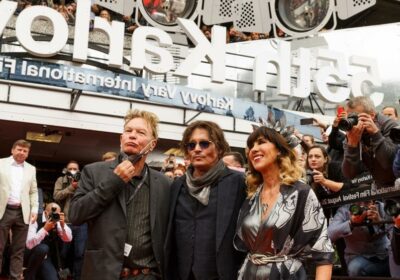Johnny Depp Attends Karlovy Vary Film Festival in Support of ‘Crock of Gold’

Despite an apparent last-minute sense of concern by Karlovy Vary fest organizers over international press coverage of Johnny Depp and his ongoing legal battle with ex-wife Amber Heard over domestic abuse allegations, the rocker/actor/producer made his appearances without much fuss and introduced the docu he co-produced, “Crock of Gold: A Few Rounds with Shane MacGowan” to welcoming crowds on Friday.
Depp’s other project at the Czech fest, the Japan-set thriller “Minamata,” filmed largely in Serbia in 2020, directed by Andrew Levitas and starring Depp as an alcoholic photojournalist, screens at Karlovy Vary’s Municipal Theater on Saturday, a historic 18th-century venue midway along the spa town’s ornate Promenade.
Taking the stage with Karlovy Vary artistic director Karel Och, the “Crock of Gold” director Julien Temple, producer Stephen Deuters and MacGowan’s wife Victoria Clarke, Depp described the filming of the 2020 rockumentary as something akin to catching and filming “a snow leopard” at times.
The film’s subject, a punk legend and Irish music icon, reflects on a career that grew out of his teenage years in London in the ‘70s, when the magnitude of the city at first caused him nervous breakdowns. MacGowan, his family and friends describe his childhood in rural Tipperary as an idyllic time, although one involving disturbing levels of alcohol consumption and cigarettes even in early childhood.
An aunt who taught him the catechism while also offering him beer and smokes and schooling him on horserace betting, was a favorite, MacGowan says, as was the uncle who owned the farmhouse and only ever really said, “Fuck.”
Calling the epithet “the most popular word in the Irish language,” MacGowan reflects on his time among the characters, trad Irish music, fields and sheep and as a vision of peace that ended all too soon.
Depp, who recalls meeting MacGowan some 30 years ago, first seeing him hoisting a beer and unsure whether he was up for a fight or a laugh, said the chance to document his life and impact on music was one he had to seize.
Likewise, Depp felt it important to capture MacGowan’s story while there’s still time – despite a clearly death-defying subject. “From the first moment I met Shane,” Depp recalled, “my instant fear was, he doesn’t have two weeks – he’s not gonna make it. That was 30 years ago.”
Indeed, some of the film’s most touching moments are recordings of banter between MacGowan and Depp, who kid each other mercilessly while raising a glass. Testimony from other musicians paying tribute and footage of an epic concert in MacGowan’s honor for his 60th birthday – on Christmas Day – show heartfelt affection for him from some of the greatest rock and pop artists around. Although kicked out of high school for running what he admits was an underground drug ring, MacGowan has always had a deep love of literature and was inspired by Irish writers in penning his best songs, he confesses in the film – though he calls Yeats a “terribly overrated” poet with “one great poem.”
The trouble, MacGowan says, is poets who are hesitant to get bloodied for the cause of Irish independence.
Despite school troubles – and later being institutionalized for emotional problems by his mother – MacGowan finally found peace, of a sort, when he stumbled upon the London punk scene. “The Sex Pistols changed my life,” he says, reflecting on long nights out at grotty music clubs, ending as often as not with bloody noses and bleary mornings.
The singer and founding member of The Pogues certainly never shied away from mixing it up himself, he says in interviews often filmed amid drinks. MacGowan says he “probably is an alcoholic,” but also says he drinks “just enough” in one scene incorporating archival TV interviews. After a moment’s pause, he adds it’s probably better to have not quite “enough.”
Boozing, drugs and fights were always part of the punk scene DNA during its heyday and as The Pogues’ fame grew through the 80s along with the demands and pressures of touring, MacGowan found himself more and more exhausted and burned out, he remembers.
But management, who got a 20% cut of gross, wouldn’t hear of cutting back the show dates, he says – that is, until he finally found himself talking to Maori spirits while on tour in New Zealand. They demanded MacGowan “paint himself blue,” he recalls. Naturally, he did – and covered his hotel room in the color for good measure.
Finally his bandmates gathered their courage and told MacGowan it had been decided he should retire, he recounts, describing one of his happiest days in years. He later launched a solo career backed by The Popes, and his legacy remains a proud one, MacGowan says, having breathed new life into Irish music through the prism of punk. And, in the spirit of the poets and his forebears, despite a life that’s badly damaged his body, MacGowan is credited with a life that savors every moment of joy that ever came along and is dedicated to raising a joyful noise with one goal: “Rail against the pain.”
Source: Read Full Article